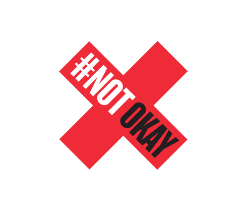#NotOkay addresses assault
November 2, 2016
Republican Presidential candidate Donald Trump’s leaked video of lewd commentary from a 2005 backstage conversation with Billy Bush from an Access Hollywood appearance sparked national and local conversations about the true prevalence of sexual assault in American society.
The second presidential debate took place two days following the release of the tape of Trump bragging about forcibly kissing, groping, and trying to have sex with women.
This debate broke the record as the most-viewed American presidential debate in history, with an estimated 84 million people tuned in, according to CNN.
This vast audience watched as Trump pardoned his words upon being asked by the moderator of the debate whether or not he boasted of sexually assaulting women.
“No, I didn’t say that at all,” Trump said. “I don’t think you understood what was — this was locker-room talk. I’m not proud of it. I apologize to my family. I apologize to the American people. Certainly I’m not proud of it. But this is locker-room talk.”
This created a wave of horrified reactions.
“He’s referring to it as locker room talk, but that’s just not okay,” senior Lizzy Quill said. “That’s not what people talk about in locker rooms. They don’t talk about sexually harassing a married woman. It’s not an excuse, it’s not an apology. It’s not sorry.”
Outraged with the lack of Trump’s sincere remorse, Kelly Oxford, a Canadian author and social media blogger, prompted an avalanche of reactions when she took to Twitter immediately following the debate.
“Women: Tweet me your first assaults. They aren’t just stats. I’ll go first.” Oxford tweeted, with an abbreviated description of her first assault story at the age of 12.
Oxford started the thread #NotOkay which soon became a national trending topic.
Stories of assault began coming in rapidly. The commonality of sexual assault became prevalent on people’s timeline of tweets.
Within five days, over 30 million people had read or contributed to Oxford’s Twitter feed since starting the powerful hashtag.
“I created the hashtag #NotOkay because I knew the volume of people coming in would be extremely large,” Oxford said in an interview with PBS NewsHour. “So, I’m not shocked by how many people are coming forward… People have desperate need to discuss this topic.”
Although their confessions were personal and painful, people were willing to publicly share their experiences with one another.
“For people who tweeted with the [#NotOkay] hashtag, it probably was hard to talk about, but every story matters. It takes bravery to talk about,” sophomore Jayne Antino said.
Rather than being looked at as a call for personal attention through social media, their bravery joins a much bigger movement and call for national attention to a social issue demanding change.
Many students saw the news and the Twitter activity through their phones.
“It’s hard for society to ignore something like this because it’s all over all social media, all forms of news that most people see on a daily basis,” senior Nicholas Pierce said.
There’s a social stigma that many people don’t acknowledge the abuse they’ve been victims of. For multiple reasons abuse is under-discussed.
There’s no reason for this. Conversations about abuse raise awareness, and may be the first step in making a change; whether in real time or online.
Not only did Oxford’s Twitter surge create a sense of community for victims but it raised awareness of just how common sexual assault is in our society. Through something negative, the voice of the people triumphed in bringing to light the criticality of addressing abuse.










